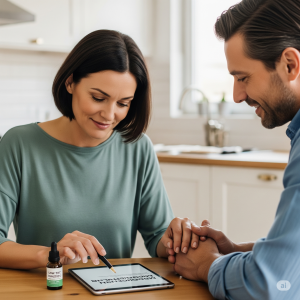- Texas Medical Cannabis Dispensaries vs Hemp Stores
- 5 Easy Steps to Fill Your Prescription
- Decoding Texas Cannabis Ratios: 20:1, 1:1, 0:1…
- Dosing & Product Education
- Texas CUP News & Legislation
- Conditions & Symptom Relief
- Practice Updates & Patient Stories
- Caregivers & Family Support
- Compliance & Legal FAQs
- Texas Medical Cannabis Guidebook 📚
- Complete Learning Library 📚
Love & Caregivers: How to Support a Partner Using Medical Cannabis

When Your Loved One Starts Cannabis Treatment…
When one partner begins using medical cannabis, the other is often left wondering:
“How do I help without overstepping?”
“Is this safe?”
“What exactly are they taking—and why now?”
At Floweret MD, we frequently meet spouses or partners who want to be supportive but feel unsure, especially if they’ve never used cannabis themselves or grew up with stigma around it.
Some worry their partner is just “giving up” on traditional medicine. Others quietly feel disconnected from a process they don’t understand. These concerns are common, and they’re valid.
💡 Why Your Support Matters More Than You Think
The truth is, a supportive partner can make a major difference in the success of a medical cannabis plan. But support isn’t about micromanaging—it’s about education, empathy, and presence.
Texas’ Compassionate Use Program (CUP) allows eligible patients access to regulated, low-THC products prescribed by a physician. This isn’t recreational use: it’s medicine. And like any medicine, success depends on more than just what’s in the bottle. It also depends on how well the person feels supported at home.
You don’t have to become an expert in cannabinoids, but learning just enough to ask thoughtful questions and reduce judgment goes a long way. Patients using cannabis often feel vulnerable, worried they’ll be misunderstood or not taken seriously. What they need most? A partner who listens without shame.
✅ What Patients Say When They Feel Understood
When a partner understands the “why” behind cannabis use, it can:
- Strengthen communication between couples
- Reduce stigma and secrecy, especially around symptom management
- Promote consistency in dosing, which leads to better outcomes
- Build mutual trust in shared decision-making about health
 We’ve seen patients thrive when their partner knows how to:
We’ve seen patients thrive when their partner knows how to:
- Help track symptom improvements
- Encourage responsible, consistent use
- Participate in refill planning and doctor follow-ups
- Recognize when it’s time for a check-in or dosing adjustment
Support can also look like non-verbal cues: making space for rest when dosing is strongest, keeping cannabis products in a safe spot, or being open to different approaches—even if you don’t use cannabis yourself.
💝 Simple Ways to Support Without Pressure
If you’re the caregiver or partner of someone using medical cannabis, here are a few simple ways to be more involved:
👂 1. Start by Listening
Ask your partner:
- “What symptom are you using this for?”
- “Do you want help remembering doses or refills?”
- “How can I support you with this?”
Sometimes, just knowing you care enough to ask makes all the difference.
📘 2. Learn the Basics
Familiarize yourself with:
- Their product’s ratio (e.g., 20:1 CBD:THC)
- The delivery method (tincture, capsule, topical)
- When they dose and how long it takes to feel relief
You can read the Texas CUP guide [on our site] or reach out to Floweret MD to understand the basics together.
🔐 3. Create a Safe Storage Routine
Designate a spot that’s:
- Cool, dark, and away from kids or pets
- Easy to access for the patient
- Agreed upon by both of you
This builds trust and reinforces that cannabis is being treated as part of a care plan—not hidden or misused.
❤️ 4. Remember—They’re Still the Same Person
Cannabis won’t change their personality. If anything, it may help bring more of them back—less pain, better sleep, more energy to enjoy life with you.

📌 Final Thought
Love is often shown in the small things: asking a good question, making space for a nap, helping refill a bottle, or just saying, “I’m proud of you for taking care of yourself.”
Supporting your partner’s medical cannabis use doesn’t mean you have to understand everything—but it does mean choosing curiosity over judgment, and connection over fear.
Let love—and knowledge—lead the way.
💬 Ready to learn more about the medicine your partner is taking?
We’re here to help. At Floweret MD, we believe healing happens in relationship—not isolation.
➡️ Book your appointment today. Let’s walk this journey—together
This content is educational and not medical advice. Consult a qualified healthcare professional before starting, changing, or stopping any cannabis or other treatment.
References
-
Reinarman, C., Nunberg, H., Lanthier, F., & Heddleston, T. (2011). Who are medical marijuana patients? Population characteristics from nine California assessment clinics. Journal of Psychoactive Drugs, 43(2), 128-135.
https://www.ncbi.nlm.nih.gov/pmc/articles/PMC4204468 -
Texas Department of Public Safety – Compassionate Use Program (CUP).
https://www.dps.texas.gov/section/compassionate-use-program -
Harvard Health Publishing – “Cannabis: What the caregiver should know.”
https://www.health.harvard.edu/blog/cannabis-what-the-caregiver-should-know-2021042322383


